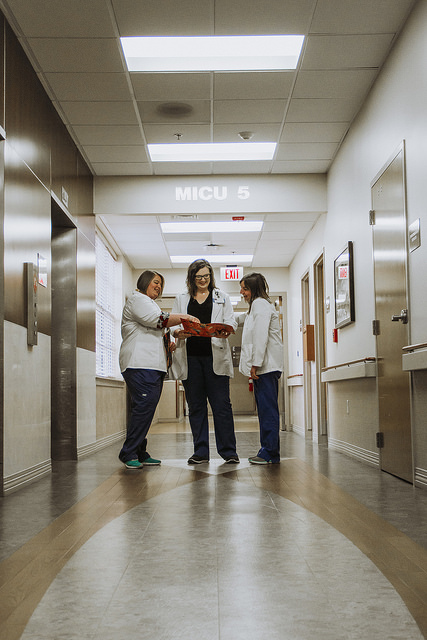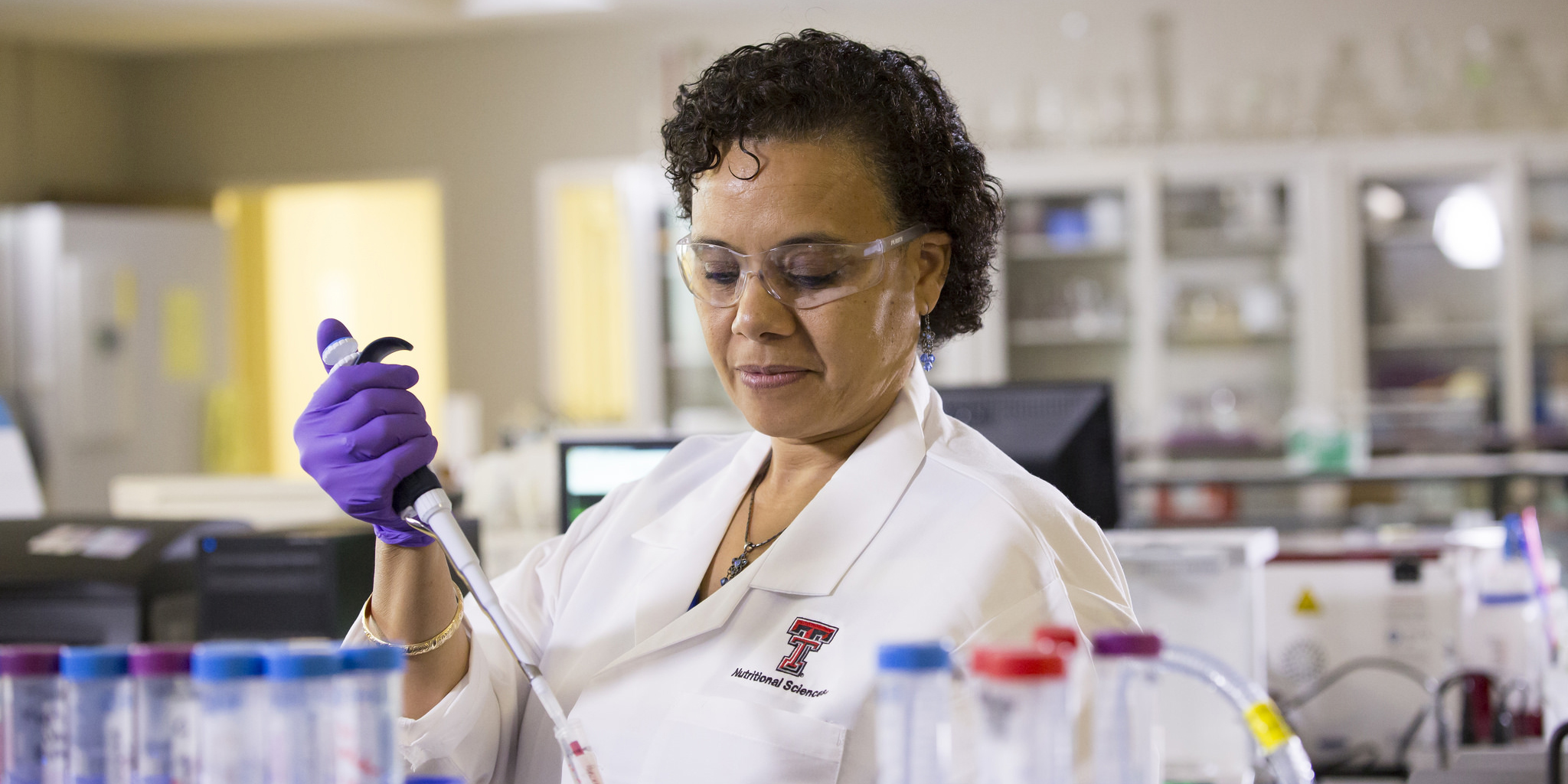Feeding the Public Interest: Nutritional Sciences at Texas Tech
Texas Tech's Role in Nutrition for Health and Innovative Research to Address Chronic Illnesses
The Nutritional Sciences department in the College of Human Sciences at Texas Tech University is dedicated to playing an integral role in public nutrition through its community outreach and advances in the latest nutritional sciences research. As the new year is underway, the department looks to support learning both in and out of the classroom through its research environment, unique to Texas Tech.
"Our staff and faculty, with strong support from the College of Human Sciences and Texas Tech University, are shaping the future through student training, and by making a difference in the lives of people in Lubbock, in Texas, as well as nationally and internationally through their outstanding research and dedicated service," Nutritional Sciences Chairperson, Nikhil Dhurandhar, Ph.D., said.
Students interested in multiple facets of nutritional sciences can earn their bachelor's degree from Texas Tech by choosing a concentration that best aligns with their career goals, whether that be pre-professional health, health and wellness, or the secondary teacher certification option.
For those wanting to have a career as a Register Dietitian, there is the opportunity to pursue a bachelor's degree in Nutritional Sciences and Dietetics. Many dietetic students go on to the Dietetic Internship program at Texas Tech, where they can simultaneously earn a master's degree while gaining their supervised internship hours.
Graduate students can hone their specialty in the traditional master's degree in Nutritional Sciences or the flexible online master's degree option. If a career in academia or research is your calling, the department offers a Doctor or Philosophy in Nutritional Sciences.
Regardless of the path students choose, they can have the confidence that they will learn from faculty members with leadership experience in a variety of areas surrounding the nutritional sciences field. These leadership roles by faculty provide further opportunities to gain insight into the latest industry breakthroughs thanks to the many hands-on experiences, like study abroad or clinical student training.
Students interested in pairing with a faculty mentor for research projects or other graduate studies can learn alongside faculty with research interests in different aspects of community and clinical research projects, or even dietetics and basic science research projects.
In the past 4 years, faculty members have applied for approximately $73 million in extramural funding and received $5 million in external funding from the National Institutes of Health (NIH), United States Department of Agriculture (USDA), and many other agencies. Many graduate students can also benefit from this funding to support their own research endeavors.
Currently, the department has $4.2 million in active funding from 15 grants, with 37 additional pending grants. Since 2012, Nutritional Sciences faculty at Texas Tech have published 26 books and book chapters, as well as 338 refereed manuscripts, including high visibility journals such as JAMA, Nature, Nature Medicine, Obesity Reviews, and American Journal of Clinical Nutrition.
As part of its laboratory-based science curriculum, graduate students and faculty members dive into the interplay between nutrition and elements of biochemistry, microbiology, physiology, and pharmacology with the aim to ultimately improve the health and ability of the human condition.
Recently, the department welcomed new state-of-the-art equipment to support its research initiatives, like the newest addition: a mouse metabolic cage unit. This versatile equipment, called the PhenoMaster, can accommodate up to 16 mice cages and would allow the researchers to precisely measure food and water intake, energy expenditure, carb vs. fat utilization, and the locomotor activity of mice.
Moving forward in its momentum of continued growth in research opportunities and research project funding, the department has seen a wave of increased graduate student numbers. Around 100 graduate students have recognized the opportunity, enrolling in programs like the newer online dietetics master's degree.
Expanding its reach beyond the Lubbock city limits is the prominent Dietetic Internship Program with an optional Master of Science (MS) degree. The Dietetic Internship is a 15-month program, consisting of 1248 hours of supervised practice. The successful program is growing, with 20 dietetic interns this academic year, and locations now in Lubbock, Amarillo, Midland/Odessa, and San Angelo.
Training students towards becoming dietitians is an important endeavor for the department. The Didactic Program in Dietetics has a national reputation for excellence, aiding its students in gaining admission to the best internship programs. In May 2018, the Texas Tech dietetics program had a 100 percent match rate for students with internships. The national average for dietetics internships typically hovers at about 50 percent.
As one of the main key points driving the department forward, community reach is a focus for outreach initiatives and the overall impact of the department. The Nutritional Sciences faculty and staff are working to implement and offer programs that are a priority for the health and nutritional well-being of the local community.
 One of the many ways that Nutritional Sciences is making a direct impact in the Lubbock
community and surrounding regions is through its new Nutrition and Metabolic Health Initiative (NMHI), located in the Texas Tech Plaza building just off campus. NMHI offers community
members a convenient way to receive nutritional treatment of chronic diseases such
as diabetes and obesity.
One of the many ways that Nutritional Sciences is making a direct impact in the Lubbock
community and surrounding regions is through its new Nutrition and Metabolic Health Initiative (NMHI), located in the Texas Tech Plaza building just off campus. NMHI offers community
members a convenient way to receive nutritional treatment of chronic diseases such
as diabetes and obesity.
NMHI's clinical services for the public include programs that offer treatment for weight loss, advanced metabolic assessment, and expert education and counseling in individual nutrition. For the Texas Tech campus, research study opportunities provide the unique experience of student training in a state-of-the-art clinical setting.
The site hosts participating faculty and staff including trained psychologists, nutritionists, physician, dietitians, and a nurse practitioner. Current facilities include waiting rooms and consultation offices, not unlike a typical medical setting. However, with a focus on patient education, the space offers group session rooms and rooms for physical testing with equipment on site such as the BOD-POD machine that measures body composition.
Supporting its goals of reaching the community, the clinical setting found in NMHI, as well as years of faculty clinical experience, make Nutritional Sciences at Texas Tech unique. As one of the only universities in the country with a clinical program in higher education, students and researchers alike have a one-of-a-kind experience to better their knowledge in a real-world clinical setting that directly impacts the society.
The goal moving forward is the bridge the gap between community and science in efforts like NMHI. Nutritional Sciences faculty plan to utilize their clinical experience in a way that not only informs the public on a better lifestyle but to provide access to state-of-the-art equipment and direct clinical care by expert faculty.
Future plans for the Nutrition and Metabolic Health Initiative at Texas Tech are to establish a children's program and a program specifically for veterans. Additional ideas being discussed include community cooking classes to better equip patients in their own environments and the concept of "Ask a Dietitian" day that encourages openness between facilitators and participants.
NMHI is training future generations of clinical scientists and health care providers through hands-on patient care, research, and nutritional guidance. Undergraduate and graduate students can look forward to the valuable experiences they will gain in scientific training and education with the support of the Nutritional Sciences faculty. Similarly, healthcare providers and researchers in the field of nutrition or basic science who wish to gain specialized training in treating obesity and all nutritional aspects of metabolic diseases.
As the department moves forward in its current strategic efforts, goals largely center around initiatives that make a difference in the lives of others in a rapidly advancing field. Expanding opportunities for cutting edge research that touches the future of science is on the horizon.
Dr. Dhurandhar says that the department is looking forward to providing more ways for students and researchers to experience community service in a way that enriches their degree experience while changing the future of health, nutrition, and basic science.
"I believe that tomorrow is only brighter," Dr. Dhurandhar said.
Interested community members, students, or researchers can visit www.nmhi.ttu.edu for more information on how to join Nutritional Sciences in its efforts to positively enhance and improve the human condition.
College of Human Sciences
-
Address
College of Human Sciences, Texas Tech University, P.O. Box 41162, Lubbock, TX 79409-1162 -
Phone
(806) 742-3031 -
Email
hs.webmaster@ttu.edu

